Thinking about switching to renewable energy? Finding the right solar provider is key. The U.S. Department of Energy says solar energy is now more affordable for Americans. Hundreds of thousands of solar panels have been installed nationwide.
By exploring local solar companies, you can get options that fit your needs. With more people using solar energy, making the right choice is important.
Key Takeaways
- Research local solar companies to find the best options.
- Consider the benefits of switching to solar energy.
- Evaluate providers based on their experience and reputation.
- Assess the cost and financing options available.
- Check for certifications and warranties offered by providers.
Understanding the Benefits of Solar Energy
Thinking about switching to renewable energy? It’s key to know the perks of solar energy. Solar energy is a great choice for homeowners, with many benefits.
Why Switch to Solar?
Going solar means using less fossil fuel, which cuts down your carbon footprint. SolarReviews and CNET say it can also save you a lot on energy bills. Here are some good reasons to switch:
- Lower energy bills
- Higher property value
- Less maintenance costs
- More energy independence
Environmental Impact of Solar
Solar energy is clean and doesn’t pollute. It’s a green way to power your home. More people are choosing residential solar energy to help the planet.
Financial Incentives to Consider
One big plus of solar energy is the financial help you can get. The federal tax credit can lower the cost of solar panels. Plus, states and local areas offer rebates and other perks for using solar energy solutions. Some incentives include:
- Federal Tax Credits
- State and Local Rebates
- Net Metering Programs
These incentives make solar energy easier to afford for homeowners.
Types of Solar Solutions Available
Solar energy comes in many forms, each designed for different needs. As a homeowner, knowing about these options can guide your choice for the future.
Residential Solar Panels
Residential solar panels are common for homes. They turn sunlight into electricity, cutting down on grid use and bills. Before installing, check your roof’s size, direction, and shade.
A home system can be 3 to 10 kilowatts, based on your needs and space. For example, a 5-kilowatt system can greatly lower your bills, if you use a lot of energy.
Solar Water Heating Systems
Solar water heaters use the sun to warm your water, a cheaper option than traditional methods. They work best in sunny areas.
There are active and passive systems. Active ones use pumps, while passive relies on gravity. Your choice depends on your needs and climate.
Solar Carports and Canopies
Solar carports and canopies offer shade and electricity. They’re great for big driveways or parking lots. They protect your cars and generate clean energy.
These structures can match your home’s look and energy needs. For example, a solar carport can shade many cars and power your home.
| Type of Solar Solution | Primary Benefit | Typical Application |
|---|---|---|
| Residential Solar Panels | Electricity Generation | Homes with suitable roof space |
| Solar Water Heating Systems | Water Heating | Homes with high hot water demand |
| Solar Carports and Canopies | Shade and Electricity | Properties with large driveways or parking areas |
Knowing about solar solutions can help you pick the best for your home. Whether you want to save on bills, reduce carbon footprint, or both, there’s a solar option for you.
How to Evaluate Local Solar Providers
Choosing a local solar provider is key to using solar energy at home or work. With many solar companies around, picking the right one can be tough. But, by looking at their credentials, customer feedback, and certifications, you can make a smart choice.
Credentials to Look For
Checking a solar provider’s credentials is important. Look for companies with a good history, experience, and the right licenses. A good solar provider should have:
- A proven history of successful installations
- Positive customer testimonials and reviews
- Industry-recognized certifications and accreditations
SolarReviews says checking credentials is key. This makes sure you work with a company that knows how to provide top-notch solar solutions.
Customer Reviews and Testimonials
Customer feedback gives you a real look at a solar provider’s quality and customer happiness. You can:
- Check online review platforms like Yelp or Google Reviews
- Ask for references from the solar provider
- Visit the provider’s website for customer testimonials
Look at the overall rating and what people say in reviews. High ratings and positive comments mean a reliable solar provider.
Certifications and Accreditations
Certifications and accreditations show a solar provider’s skill and commitment to quality. Look for certifications from trusted groups, like the North American Board of Certified Energy Practitioners (NABCEP). These show the provider meets high standards and keeps up with new industry trends.
“Certifications like NABCEP signify a provider’s dedication to excellence and customer satisfaction.” – Industry Expert
By looking at these factors, you can pick a solar provider that fits your needs and ensures a great solar project.
The Importance of Solar Incentives
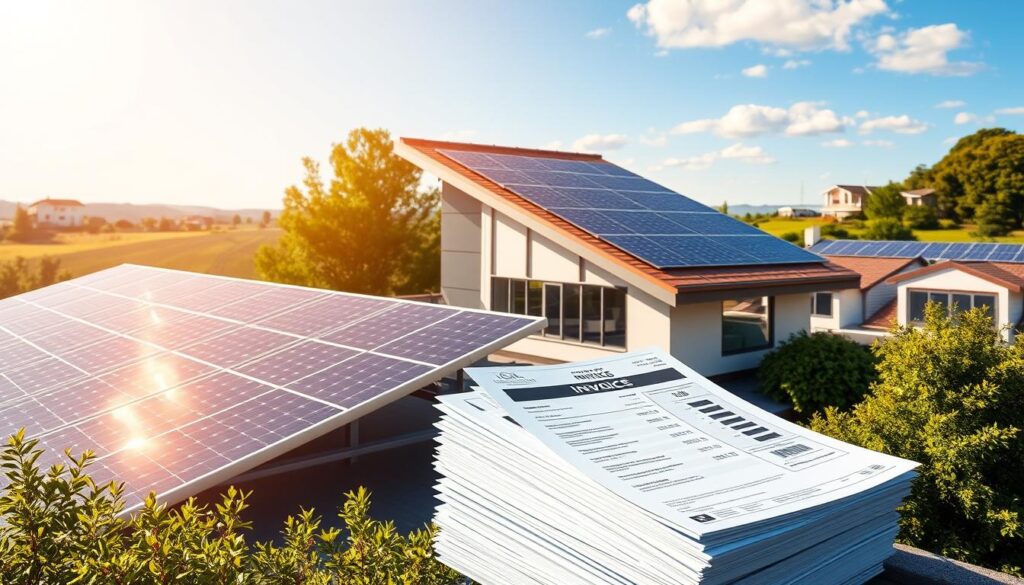
Thinking about switching to solar energy? It’s key to look into the incentives that can help with the upfront costs. Solar incentives make solar energy more affordable for homeowners in the U.S.
Federal Tax Credits
The U.S. government gives tax credits to encourage solar energy use. The Solar Investment Tax Credit (ITC) lets homeowners get a tax credit for their solar system costs. The U.S. Department of Energy says this credit has helped solar energy grow a lot in the U.S.
“The Solar Investment Tax Credit has been a game-changer for the solar industry, enabling more homeowners to invest in solar energy,” says Abigail Ross Hopper, President and CEO of the Solar Energy Industries Association.
State and Local Rebates
States and local governments also offer rebates and incentives for solar energy. These rebates can differ a lot, so it’s important to check what’s available in your area. For example, some utilities give rebates for solar installations, while others offer special financing.
- Check with your state energy office to explore available rebates.
- Contact local utilities to inquire about their solar incentive programs.
- Consult with solar installers to understand the incentives they offer and how they can benefit you.
Net Metering Explained
Net metering is another big incentive. It lets homeowners make their own electricity and send extra to the grid. This can lower your energy bills a lot, as you get credits for the extra energy. But, net metering rules differ by state and utility, so knowing the rules in your area is important.
“Net metering is a key policy for the solar industry, as it lets homeowners get credit for the extra energy their solar panels make,” notes David Springe, Executive Director of the National Association of State Utility Consumer Advocates.
Using these incentives can make your solar energy system cheaper. When looking at solar power system quotes, remember to include the incentives you’re eligible for. They can really change the cost.
Assessing Your Energy Needs
Figuring out your energy needs is key to picking the right solar solution for your home. You need to know how much energy you use now.
CNET says it’s important to size your solar system right to get the most from solar energy. This means looking at how much energy you use to figure out the right size for your solar panels.
Conducting an Energy Audit
Starting with an energy audit is the first step. This means looking at your past energy bills to see how much you use. You can also use tools to watch your energy use as it happens.
An energy audit shows you where you can use less energy. This can help you save money on cheap solar panels by needing a smaller system.
- Look at your energy bills from the last year to spot patterns in your use.
- Use devices to track your energy use in real-time.
- Find out which appliances use a lot of energy and how they affect your total use.
Identifying Peak Energy Usage
Finding out when you use the most energy is important. This is usually during the day when you’re using things like air conditioning or big appliances.
Knowing when you use the most energy helps you size your solar system right. This way, you’ll have enough power when you need it most.
“Understanding your energy consumption patterns is key to selecting the appropriate solar panel system.”
– Expert in Renewable Energy
Sizing Your Solar System
Getting the size of your solar system just right is critical. A system that’s too small won’t give you enough power. But a system that’s too big can cost too much.
To size your system right, think about how much energy you use, how much sunlight you get, and how efficient your panels are. Talking to a pro can help you find the perfect size for your solar system.
By carefully looking at your energy needs, you can choose the best solar panel system. This ensures you get the most out of your solar energy investment.
Researching Local Regulations and Permits
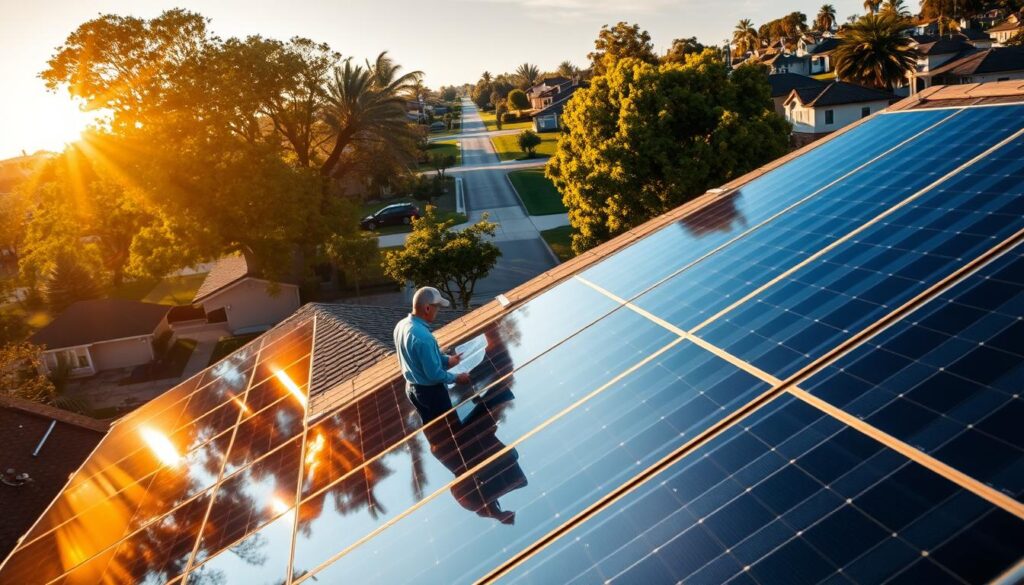
To smoothly switch to solar energy, it’s key to check local rules and permits. This step is vital for a smooth setup and to dodge legal or technical problems later.
The U.S. Department of Energy offers great resources. They help homeowners and businesses grasp the local rules and permits for solar setups. Knowing these rules helps you smoothly adopt solar energy solutions.
Understanding Zoning Laws
Zoning laws are important for what you can do with your property, like installing solar panels. These laws differ a lot from place to place. So, it’s important to talk to your local government about your area’s specific rules.
Some common rules include the height and location of solar panels, and what type of panels are allowed. Following these rules helps avoid fines or having to remove your solar setup.
Required Permits for Installations
Getting the right permits is a big step before setting up your solar system. The permits needed can change, but often include electrical and building permits, and sometimes special solar permits.
Your solar installer can help with the permits, but knowing what’s needed is good too. This knowledge ensures your setup is correct and you’re ready for any inspections or approvals.
Connecting to the Grid
After setting up your solar system, you’ll need to connect it to the grid. This means working with your utility company to make sure it works right and you can use net metering or other benefits.
It’s important to know what’s needed for grid connection in your area. This includes the technical standards, how to apply, and any fees. Your solar installer and utility company can guide you through this smoothly.
Comparing Solar Quotes
When looking at solar quotes, it’s important to compare them carefully. This helps you choose the right solar energy system. If you’re looking to find local solar companies, make sure to review their quotes well.
First, know what a solar quote should include. A good quote lists the total cost, the equipment’s type and quality, installation fees, and any extra charges.
What to Include in Your Quote
A detailed solar quote should break down costs and services. Look for these key points:
- System size and equipment quality
- Installation costs and timeline
- Warranty and maintenance information
- Financing options and incentives
- Monitoring and support services
SolarReviews says it’s vital to check the quote for all details. This avoids surprise costs later.
Analyzing Cost per Watt
The cost per watt is a key metric for comparing quotes. It shows the system’s cost relative to its size. To find the cost per watt, divide the total cost by the system’s wattage.
| Provider | Total Cost | System Wattage | Cost per Watt |
|---|---|---|---|
| Solar Company A | $20,000 | 5000 watts | $4.00 |
| Solar Company B | $22,000 | 5500 watts | $4.00 |
| Solar Company C | $19,000 | 4750 watts | $4.00 |
As the table shows, even with different total costs, the cost per watt can be the same. This means the prices are competitive.
Understanding Financing Options
CNET advises understanding your financing choices when comparing quotes. You can pick from loans, leases, or power purchase agreements (PPAs).
Loans let you own the system, while leases and PPAs offer other options. Choose based on your finances and goals.
By comparing solar quotes and understanding the details, you can make a smart choice. When you solar near me, compare quotes from various providers to find the best one for you.
Choosing Between Purchase and Lease
When looking into solar energy for your home, it’s key to know the difference between buying and leasing solar panels. This choice impacts your wallet, energy freedom, and how happy you’ll be with your solar setup.
Benefits of Buying Solar Panels
Buying solar panels comes with many perks. For one, you qualify for tax credits like the Federal Solar Investment Tax Credit (ITC), which can cut your taxes. Plus, owning your system means you’ll save money on your energy bills over time. The U.S. Department of Energy says you could save $10,000 to $30,000.
Also, buying solar panels can boost your home’s value. Homes with solar systems sell for more than those without. Buyers like the savings and the green benefits.
Advantages of Leasing Options
Leasing solar panels is great if you can’t afford to buy. It often requires little to no money down, making solar energy easier to get. Leases also include system maintenance and monitoring, so you don’t have to worry about upkeep.
Leasing can give you stable energy costs because your payments stay the same. But, make sure you know the lease terms, like any rate hikes.
Evaluating Power Purchase Agreements
A Power Purchase Agreement (PPA) is another choice. A third party installs and looks after the solar system, and you buy the electricity at a set price. PPAs can cut your energy bills right away without needing to pay upfront.
When looking at a PPA, check the contract length and terms, like any rate hikes. Also, think about how it might affect your home’s value and if there are ways to get out of the deal.
In short, picking between buying, leasing, or a PPA depends on your finances, energy use, and future plans. By weighing these options carefully, you can choose the best fit for you.
Finding Qualified Installers Near You
Finding the right solar installer is key to a successful solar project. It can be tough without the right help. Knowing how to find qualified solar providers in your area is important.
How to Leverage Online Tools
Online platforms are great for finding solar installers. Sites like SolarReviews and CNET offer guides and reviews. You can use these to:
- Research local solar installers
- Compare reviews and ratings
- Check for certifications and licenses
These tools help you narrow down a list of top solar installers in your area.
Asking for Recommendations
Personal recommendations are very helpful. Ask people you know who have solar panels. They can share their experiences with:
- The quality of the installation
- The professionalism of the installers
- Any post-installation support
These stories can help you understand the reliability and skill of solar providers.
Attending Local Energy Fairs
Local energy fairs are great for meeting installers face-to-face. These events let you:
- Learn about new solar technologies
- Talk to experts about your energy needs
- Get quotes from different providers
Going to these events can help you understand what to expect from solar providers.
Here’s a comparison of key factors to consider when choosing solar installers:
| Factor | What to Look For | Why It Matters |
|---|---|---|
| Experience | Number of installations, years in business | Ensures they have the necessary expertise |
| Certifications | NABCEP certification, other local certifications | Verifies their professionalism and adherence to industry standards |
| Customer Reviews | Positive reviews, testimonials | Indicates customer satisfaction and reliability |
By carefully evaluating these factors and using the resources above, you can find a qualified solar installer. They will meet your needs and help you reach your solar goals.
Maintaining Your Solar System
Keeping your solar panels in good shape boosts their performance and life span. It’s key to keep your solar system in top condition. This ensures you get the most out of your investment in solar energy, including the initial solar power system quotes.
Routine Maintenance Tips
Regular cleaning is a must for your solar system’s efficiency. Dust, dirt, and debris can cut down your panels’ effectiveness. Clean your panels twice a year, or more if you live in a dusty area.
Also, check your solar panels for damage or problems. Look for cracks or broken cells and make sure all connections are tight. Keeping the area around your panels clear of debris and plants can also help.
Recognizing Common Issues
Knowing common problems with your solar system helps you fix them early. A drop in energy production might be due to dirty panels, shading, or equipment failure. If you see a big drop in energy, check what’s causing it.
Watch out for inverter malfunction too. The inverter is key for converting DC to AC power. If it’s not working right, your system won’t work. Keep an eye on your system’s performance and any error messages or lights on your inverter.
When to Seek Professional Help
While you can do some maintenance yourself, there are times to get professional help. If you’re not sure how to clean your panels safely, or if you find an issue you can’t handle, get a pro.
If your system isn’t working as it should, or if your warranty is about to expire, get a pro to check it. They can tell you what repairs or maintenance you need to keep your system running well.
Future Trends in Solar Technology
When looking into solar energy for your home, it’s key to know about the latest trends. The solar world is changing fast. New tech is making solar panels more efficient, affordable, and easy to get.
Emerging Innovations
The U.S. Department of Energy says solar panel tech will keep getting better. Expect improvements in storing energy and connecting to the grid. These changes will make solar power for homes even better.
Smart Technology Integration
Smart tech is becoming a big part of solar energy. It lets homeowners watch and control their energy use. This helps them get the most out of their solar systems.
Community Solar Initiatives
CNET notes that community solar projects are growing. They let many people benefit from one solar array. This is great for those who can’t put panels on their own roof.
As solar tech keeps improving, knowing about these trends is important. It helps you get the best value from your solar energy investment.




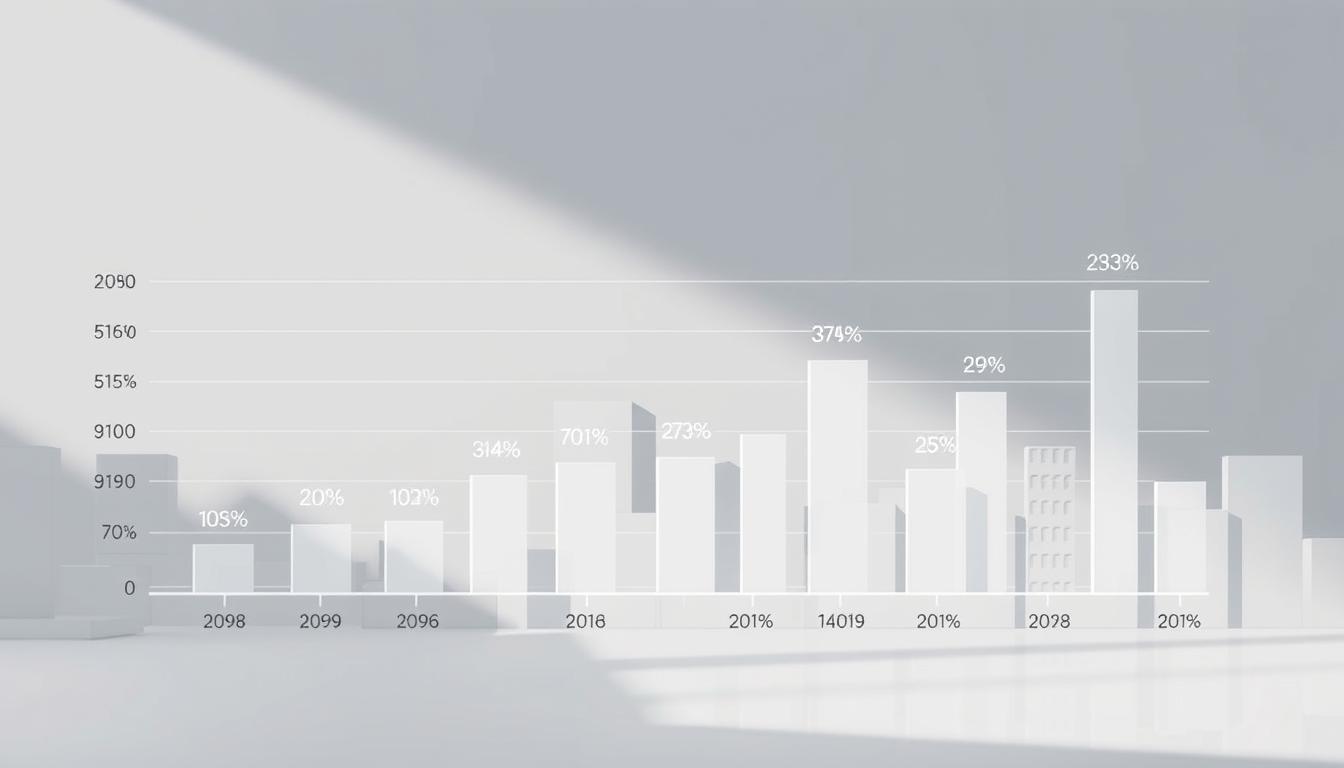


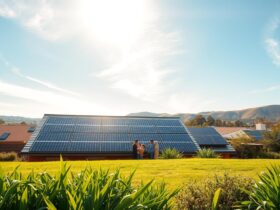

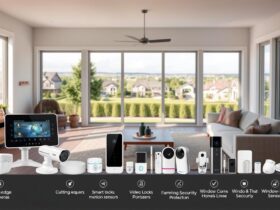

Leave a Reply